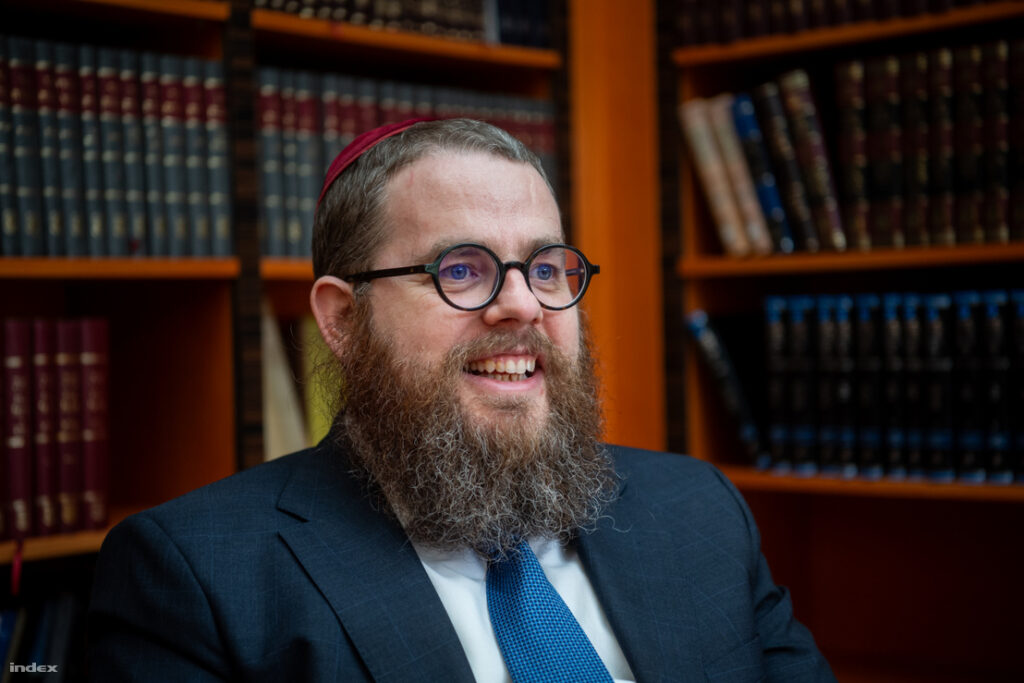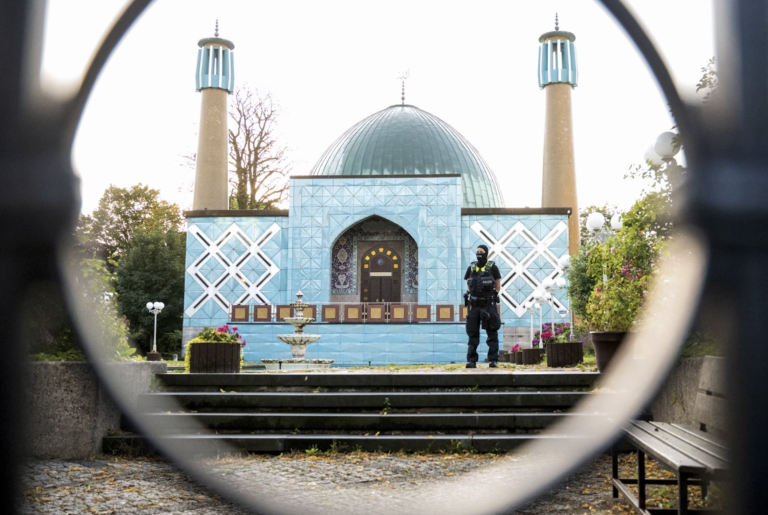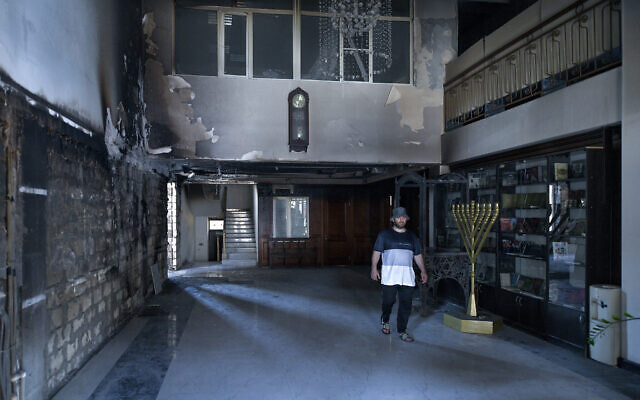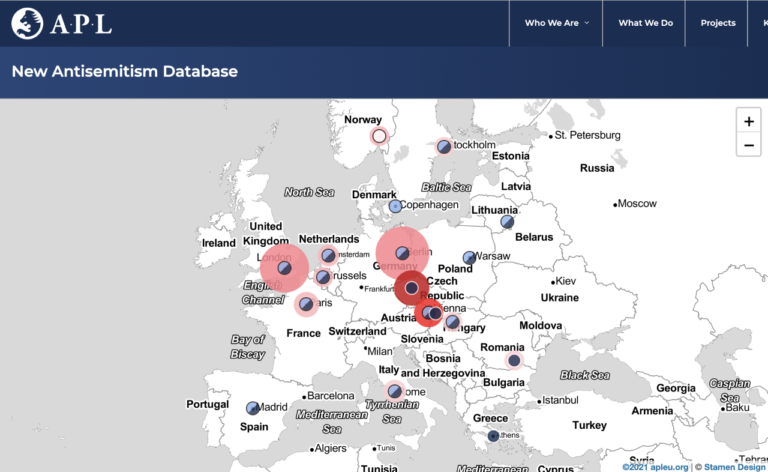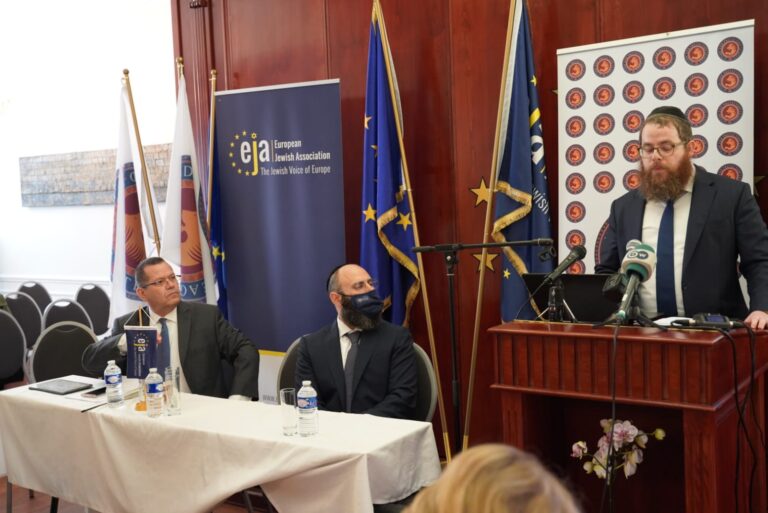Hungary will be of huge significance if it becomes the first EU country to move its embassy to Jerusalem, the Orthodox rabbi told Telex, saying the move could be interpreted as a biblically based worldview statement. Regarding the House of Fates to be built at the Józsefváros railway station, he said that an international working group had drawn up the plans, and the rest is up to the Hungarian government to decide. Interview by Telex.
One of the founders and the chief rabbi of the Unified Hungarian Jewish Congregation (EMIH) and rabbi of the Óbuda synagogue, we asked Slomo Koves the following questions:
- What did he discuss with Israeli Prime Minister Benjamin Netanyahu?
- Why is it important to move Hungary’s embassy to Jerusalem, Israel?
- What is the reason for Western Europe’s regular accusation of Hungary of antisemitism?
- What is the problem with János Lázár’s praise of Miklós Horthy?
- What is the concept for the House of Fates that Hungarian and Israeli experts have developed?
- What message does the House of Fates have for non-Jewish visitors?
- Why is it that Jewish organisations in Hungary are in dispute?
Elon Musk recently said that George Soros’s foundations are explicitly against Western civilisation. Do you agree with the American billionaire?
Slomo: I am not sure I fully understand what Musk meant. The most I can say is that many people in Israel complain that some of the foundations funded by George Soros are linked to the far left in Israel. These often carry out anti-Israel propaganda on the grounds of human rights.
Following the US, Hungary would move its embassy to Jerusalem
Speaking of Israel. You recently met Israeli Prime Minister Benjamin Netanyahu. What was the reason for the meeting?
Slomo: The focus was on the Chabad movement and relations between the Israeli and international public life, but also Hungary and the Hungarian Jewish community were discussed. This gave me the opportunity to present the Prime Minister with the concept plan for the House of Fates exhibition, and the possible move of the Hungarian Embassy to Israel was also discussed.
FOR SOME TIME NOW, INFORMAL DISCUSSIONS HAVE FOCUSED ON THE POSSIBILITY OF HUNGARY BECOMING THE FIRST EU COUNTRY TO MOVE ITS EMBASSY TO JERUSALEM.
We have discussed what roles the EMIH and the Hungarian Jewry, committed to the fate of Israel, could play in case of such a development.
The move of the Hungarian embassy to Jerusalem, Israel, is not just an administrative issue; it is a matter of ideology. It is a move that runs completely counter to mainstream politics.
Indeed, there is a perceivable worldview aspect in this move, which a rabbi has a duty to point out. In a broader sense, the denial of the connection between Judaism and Jerusalem calls into question the very basis of Western civilisation, the Judeo-Christian, biblical values.
FOR DECADES, THE ARAB WORLD AND INTERNATIONAL FAR-LEFT ORGANISATIONS HAVE SOUGHT TO CHALLENGE THE HISTORICAL RIGHT OF JEWS TO JERUSALEM AND ISRAEL.
They do this despite the fact that Jerusalem is mentioned more than 600 times in the Hebrew Bible. When, under President Trump, the United States became the first country to move its embassy to Jerusalem, it not only formally recognised Jerusalem as the capital of Israel but also set an important ideological anchor, the importance of which I believe should not be underestimated. It will also be of huge significance if Hungary indeed becomes the first EU country to join this movement, and the move of the Hungarian embassy to Jerusalem can also be interpreted as a biblically based worldview statement.
Aren’t you afraid that by moving the embassy, Hungary will push the buttons of some in Brussels?
As a rabbi, I can say that this is a metaphysically important issue worth standing up for, even if it „pushes the buttons” of some. In the Bible, God said to Abraham, ‘I will bless those who bless you’. I am convinced that an alliance with Israel and the Jewish people will always bring blessings to a nation. By the way, criticisms of Hungary are usually accompanied by accusations of antisemitism as a red herring. Well, such a move could also be viewed in this context.
Did it come up at the meeting that the Israeli Prime Minister might visit Hungary again?
There are plans for a visit in the near future, perhaps later this year. I hope that this will happen, not least because I have invited Netanyahu to Hungary to celebrate the 20th anniversary of the founding of the EMIH.
Miklós Horthy, János Lázár and the dead end history of Hungary
Earlier, you mentioned antisemitism. How can we receive such red herring (as you called it) criticism from Western European countries, where atrocities against Jews are practically systematic? Help me understand this!
I do not think that those who point their finger at Hungary from Western Europe have a very differentiated approach to this issue, and the political messages are now infinitely simplified everywhere. Public opinion polls clearly show that for decades now, between 10 and 40% of the Hungarian population is open to antisemitic views, but to claim that Hungary is an antisemitic country is nonsense.
As for the safety of the Jewish community, there is no question that Hungary is currently one of the safest European countries for Jews.
Do you not think that perhaps even worse statistics could be given for France, Belgium or Germany?
This is about something else. What comes up again and again in Hungarian public discourse, and also in the international public, is primarily – as István Bibó put it – about the attitude towards certain periods of Hungarian history, which have been a dead end. I am thinking of the period between the two world wars, the Jewish laws, the involvement in the Second World War and the deportations after the German occupation. It is not easy to build a national policy on coherent historical references when few of the great figures of the 20th century can be called impeccable. In fact, that is the problem.
Are you referring to Minister János Lázár, who recently praised Miklós Horthy?
I thought of him, too. János Lázár said a few weeks ago that Miklós Horthy was an exceptional statesman. Among historians, there is no substantive debate about the person and responsibility of Miklós Horthy.
The public life between the two world wars, which was deeply imbued with antisemitism, and the numerus clausus and later the Jewish laws, all merged with his system, and because he remained in office after the German occupation, he was complicit, along with the Hungarian state administration, in the deportation of nearly 500,000 Hungarian citizens to death camps. I don’t think Lázár would dispute all this, but unilateral glorification of Horthy may also indirectly legitimise the crimes of the governor.
House of Fates: a new concept on the table
It is indeed important to face up to historical mistakes. This is the aim of the House of Fates project, which was launched in 2013 by Mária Schmidt and Minister János Lázár. The end result was that the Józsefváros railway station building complex, which houses the museum, was completed, but the project participants got into an argument, and nothing happened for years. Where does the project stand now?
When I learned about Maria Schmidt’s vision in 2018, I proposed enriching and expanding the concept. The result was that Maria Schmidt cut off contact with me.
THEN EMIH FORMED A TEAM OF NATIONAL, ISRAELI AND AMERICAN EXPERTS AND PUT A COMPLETELY NEW CONCEPT ON THE TABLE.
Over the past few years, we have conducted more than one hundred and fifty interviews with Hungarian Holocaust survivors in Hungary, Israel, France, the USA, Switzerland and Italy. I am very happy that this material has been produced because, unfortunately, half of the survivors interviewed are no longer alive. We have also put together a valuable collection of 20,000 items of Holocaust-related artefacts. We have recently launched a website presenting the exhibition concept, which has been ready since 2021. The project has so far cost EMIH HUF4-500 million, to which the Hungarian government has contributed HUF200 million.
When will the House of Fates open?
The plans are ready; the rest is up to the Hungarian government.
You mentioned that a different approach has been chosen to present the Shoah, the Holocaust. What is the concept of the House of Fates?
The concept is based on five main pillars, the first of which is the historical context. We believe that the Holocaust cannot be discussed in isolation, so we have defined a period from the emancipation of Hungarian Jewry in the 19th century to the present day, up to the 2020s. The second pillar is personal engagement, and the third is emotional engagement, with personal recollections and stories as the most important means of bringing the events to life for visitors. The fourth and perhaps most important pillar is the Jewish perspective. In telling the story, it is important that the Jews are not portrayed solely as a mass of helpless victims deprived of their human dignity.
But they were victims! Almost 6 million Jews died in European concentration camps, 450,000 in Hungary.
This is a fact, but in presenting the history of the Holocaust, the barbaric threat of darkness will be more dramatic if the dim light of human perseverance that contrasts with the darkness is also shown. Though small in number, there were Jews who sought to resist the darkness as active agents, both physically and spiritually, and there were some brave non-Jewish compatriots who saved lives. In addition, many visitors will be encountering Judaism for the first time here, and it is particularly important to show them that Judaism is not only a community of fate but also the depository of a wonderful culture that is three thousand years old and that has given humanity important, universal values that are still valid today.
And what is the fifth pillar?
The moral message. The aforementioned resistance is not only a physical resistance; it is an adherence to the values that helped those who suffered to maintain human dignity or even to survive. An excellent example of this approach is, for example, the film Son of Saul, where the protagonist tries to maintain his humanity through spirituality even in an infinitely vulnerable situation. I think this is central to the concept.
Divergent identity models and clashes between Jewish organisations
Tensions have been rising between Jewish communities in Hungary. There are clashes between the neo-Jewish Mazsihisz, your organisation, the EMIH, and the Hungarian Autonomous Orthodox Jewish Community (MAOIH), which represents the Orthodox tendency. The EMIH has been accused of swallowing the Orthodox from head to toe. Where does this case stand?
There were, are and always will be clashes because this is a part of Jewish life, but let us step back a little and look at this situation from some distance. Hungarian Jewish organisational politics, like other organisations, must have some kind of underlying principle, background idea, or ideology. In the decades of socialism, the role of Jewry in the public was defined in the party centre as being based around the remembrance of the Holocaust and the cry of alarm against antisemitism. This was inherited by the Mazsihisz at the time of the regime change, and the EMIH was created as a counterpole.
So, is it basically the difference of ideology that causes the tensions between your organisations?
There are two different identity models. At the heart of the model represented by the Mazsihisz is victimhood imposed on Judaism by the tragedies of history and the interests of a dictatorial power.
EMIH BELIEVES THAT WE MUST BUILD OUR IDENTITY AND OUR COMMUNAL IDENTITY ON OUR VALUES.
For us, Judaism is not about martyrdom, but about thousands of years of values, traditions and customs that provide a useful guide to a meaningful, happy life.
The casus belli was the claim by some that the EMIH had „stolen” the Kazinczy Street Orthodox Synagogue.
These false accusations have most likely come from those Mazsihisz leaders who find it difficult to accept that the buoyancy of their preferred identity model is steadily diminishing. Guilt may also play a role in fuelling the divisions, as these leaders have not placed enough emphasis on religious life in recent decades. This is also partly the reason why the MAOIH left the Mazsihisz in 2017. The EMIH will do everything in its power to ensure that this 150-year-old denomination, which has a long tradition but only traces of it in Hungary, does not become a victim of irresponsible mismanagement, petty personal interests or the interests of the Mazsihisz.
But what do a few dozen members of the Orthodox community have to say about this argument?
Many of the MAOIH’s members are also members of the EMIH or use its educational and other institutional services. In practice, there is no sharp separation and opposition that some would like to see. The goal is to get the three or four Orthodox synagogues that have been closed for decades to reopen and function. Our goal is to preserve the pilot light of Hungarian Orthodoxy.
Original article in Hungarian: Telex.hu
Photo credit: Telex.hu
